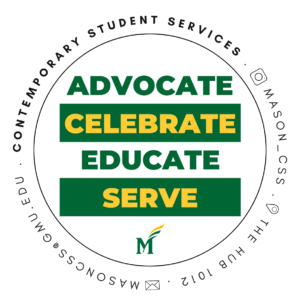
Contemporary students are an essential part of the Mason campus. Below are more resources for Contemporary Resources. Check out the pages for more detailed information about the specific communities.
Contemporary Student MentorsContemporary Student Mentors are a peer resource to support you while you adjust to Mason. They are students who have shared experiences to you, they all live off-campus or have transferred to Mason. If you’d like to set up a meeting with someone click here.
Contemporary Student Advisory Board
Apply for the Contemporary Student Advisory Board! The Student Advisory Board is an opportunity for you to create a Mason that is engaging for all students. It’s a place to share your conners, meet other students like you, and make a positive impact on your peers and campus. All Contemporary Students are welcome! Applications are ongoing. Contact cpurnel@gmu.edu or afergu5@gmu.edu for more information.
The Contemporary Student Lounge is located in The Hub 1012. There you’ll find a comfortable place to connect with other students or do homework in a casual environment – complete with coffee, a microwave, a refrigerator, and programs! Stop by for a chance to get to know your Contemporary Student Advisors and other students!
Stay Informed: Subscribe to our weekly newsletter
Our weekly newsletter is sent to you every week during the academic year. It provides a preview of the events happening on campus that week and filters them based on what we think are great picks for our off-campus and contemporary student community.
OUR HOPE IS TO MAKE IT EASIER FOR YOU TO STAY INVOLVED AND CONNECT WITH THE MASON CAMPUS.
Interested in receiving our weekly newsletter? Join our Contemporary Student Services Group on Mason 360 to join our weekly newsletter.
You can always unsubscribe if you find it’s not for you.
Are you an office on campus that would like their event advertised in our newsletter?
Email us at masoncss@gmu.edu and we will get back to you as soon as possible to help the Mason community see your amazing events!

Beginning on Campus
Setting up a successful foundation at Mason includes activating your accounts.
Patriot Pass and Mason Live
Your first step is to set up your Patriot Pass, as this is how you set up your Mason NetID (username) and password. Setting this up allows you to access your Mason Live e-mail account. If you do not know your G number, please contact your assigned Success Coach immediately. As for your “claim code,” please try your date of birth (MMDDYY). If this does not work, please contact your Success Coach.
Once you have set up your Patriot Pass (i.e. your NetID and password), you will complete the following steps to set up your MasonLive account:
To activate your MasonLive account:
Go to password.gmu.edu
- Scroll down to Option 5 (To activate/reset your MasonLive Microsoft Account) and click on the link.
- On the Central Authentication Service page, log in using your Mason NetID and Patriot Pass Password.
- Type in a new MasonLive Microsoft Password using the guidelines provided. *Please note: your MasonLive Microsoft Password and your Patriot Pass password CANNOT be the same
- Click the Save Password button. You have created a MasonLive Microsoft Password
- To log in to your account, go to masonlive.egmu.edu and click “Login here” with your MasonLive account.
- You’ll log in with..
- NetID@masonlive.gmu.edu
- MASON LIVE Microsoft Password (this is the password you just created)
- You will be asked to select your language and time zone.
- All done! You are now inside your MASON LIVE inbox. *Please note: this only changes your MASON LIVE Microsoft Password. Your Patriot Pass password is not impacted.
Mason ID Card
As for your Mason non-degree ID card, you will need to visit the Mason ID Card Office on the Fairfax campus to get your picture taken and receive your ID same day. Please bring a form of picture ID (i. e. a current driver’s license, military ID, visa, passport) and your G number with you to the Mason ID Card Office in order to obtain your Mason ID.
Immunization Records
Submitting you immunizations records to Student Health Services at Mason is a requirement of all Mason students. Please take the following steps to submit your records:
- Collect your immunization records: Contact your parent/guardian, a healthcare provider who administered your vaccines, military service branch, a previous U.S. high school or 4-year university.
- All students are required to download the Immunization Record Form. Students must complete Parts 1-4. A healthcare professional must fill out Parts 6-8 for students born after December 31, 1956. If indicated, Part 5 must be filled out by a healthcare professional, regardless of student date of birth.
- Attach supporting documentation to the Immunization Record form and submit to the Immunization office in one of three ways:
- Upload to the online patient portal (preferred method, you can check the status of your submission)
- Mail to: Immunization Office, 4400 University Drive, MS 2D3, Fairfax, VA 22030
- Submit in-person or drop-off to SUB 1, Room 2347
Immunization Office Contact Information:
Phone: 703-993-2135 Office: SUB 1, Room 2347 and 2349 Email: immunize@gmu.edu
Please visit Student Health Services website for more details and questions about health insurance options, including a list of Frequently Asked Questions about the submission of immunization records (scroll to the bottom).
Financial Resources for Contemporary Students
Programs for Contemporary students that may help you complete your degree at Mason. Please look into them and reach out George Mason Financial Aid Office for any questions:
Child Tax Credit
Eligible individuals may receive up to $3,600 for each child under age 6 and up to $3,000 for each child ages 6 through 17. Eligible families will receive the other half by claiming the child tax credit when filing their 2021 federal income tax return in 2022. Most families can receive the full amount—even families with little to no income.
Most parents should have received the tax credit automatically, but if for some reason they did not and they are eligible, then they should receive the full amount of the credit when they file their income tax return.
Recovery Rebate Credit / Economic Impact Payment
Students who did not receive an Economic Impact Payment under the American Rescue Plan, and on whose behalf as a dependent a payment was not made, could be eligible for a $1,400 per-person Recovery Rebate Credit when they file taxes in 2022. To be eligible for the full amount, a student would typically have to be:
- single and make less than $75,000/year;
- the head of a household and make less than $112,500/year; or
- married and the couple together makes less than $150,000.
For more information on eligibility, visit the IRS website on Economic Impact Payments.
Supplemental Nutrition Assistance Program (SNAP)
Students may be eligible for the Supplemental Nutrition Assistance Program (SNAP), a Federal program that provides nutrition benefits to supplement the food budget of low-income individuals and families so they can purchase healthy food. Eligible students can use SNAP benefits to buy food for their households, including fruits, vegetables, meat, poultry, fish, dairy products, breads, cereals, and other foods such as snack foods and non-alcoholic beverages.
Students can find their local office or State SNAP webpage using the SNAP State Directory of Resources. For more information about student eligibility and other student exemptions, visit the SNAP Students webpage.
Affordable Connectivity Program
Eligible households can receive a benefit of up to $30 off their monthly internet bill (or up to $75 per month if the household resides on qualifying Tribal lands). Students can apply here starting on December 31, 2021. Households are required to contribute more than $10 but less than $50 toward that connected device.
Eligible households must both apply for the program and contact a participating provider to select a service plan. To receive this benefit, a student will need to provide documentation that the student received a Federal Pell Grant for the current award year.
There are three ways for eligible households to apply:
- Contact a participating broadband provider directly to learn about their application process. If an eligible household is unable to apply directly, it may apply by using option 2 or 3 below, and then contacting a participating provider to select a service plan.
- Go to ACPbenefit.org to apply online and to find local participating providers. After applying, contact a participating provider to select a service plan.
- Call (877) 384-2575 for a mail-in application or print a copy, and return it along with copies of documents showing proof of eligibility to:
Affordable Connectivity Program Support Center
P.O. Box 7081
London, KY 40742
The student may provide along with their application a screenshot from the student’s StudentAid.gov profile that displays their receipt of the Federal Pell Grant or other records provided by the IHE to serve as that documentation.
Other Federal Assistance
Below, we also include an illustrative list of federal programs that we encourage IHEs to engage in broad outreach around, but for which IHEs are not at this time permitted to use FAFSA data to engage in those communications. For federal programs that, at this time, have not been designated under the Higher Education Act, the Department still encourages institutions of higher education to broadly inform their campus communities about their availability. However, because they are not been designated, the IHEs are not permitted to use FAFSA data in those communications. Below are illustrative examples of federal assistance that some students may quality for.
Unemployment Insurance
If students have become unemployed through no fault of their own (as determined under State law), and meet other eligibility requirements of State law, they may be eligible for unemployment insurance benefits.
- Unemployment insurance payments (benefits) are intended to provide temporary financial assistance to unemployed workers who meet the requirements of State law.
- Each State administers a separate unemployment insurance program within guidelines established by Federal law.
- Eligibility for unemployment insurance, benefit amounts, and the length of time benefits are available are determined by the State law under which unemployment insurance claims are established.
Students can contact their State Unemployment Insurance agency as soon as possible after becoming unemployed.
Housing Assistance
The American Rescue Plan expanded numerous COVID-19 housing supports for homeowners, renters and landlords who may be struggling to pay their rent or mortgage. We encourage IHEs to inform students about the Homeowners Assistance Fund (HAF) and local Emergency Rental Assistance programs. Links to available resources and applications are available through the Consumer Financial Protection Bureau.






